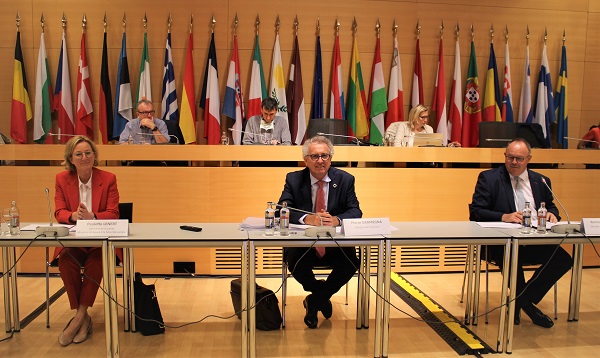 L-R: Paulette Lenert, Minister of Health, Minister Delegate for Social Security; Pierre Gramegna, Minister of Finance; Romain Schneider, Minister of Social Security;
Credit: MSAN
L-R: Paulette Lenert, Minister of Health, Minister Delegate for Social Security; Pierre Gramegna, Minister of Finance; Romain Schneider, Minister of Social Security;
Credit: MSAN
The quadripartite committee met on Wednesday 17 June 2020 at the Luxembourg Chamber of Commerce to discuss matters related to health and maternity insurance
The committee came together under the chairmanship of Luxembourg's Minister of Social Security, Romain Schneider, in close collaboration with Minister of Health Paulette Lenert and Minister of Finance Pierre Gramegna.
The ministers began by thanking all care providers and nursing staff, as well as all those involved in the fight against the spread of coronavirus, for their enormous effort and investment throughout this crisis. Likewise, the ministers welcomed the involvement and constructive collaboration of the social partners, represented on the board of directors of the National Health Fund (Caisse nationale de santé, CNS), when developing various measures to mitigate the impact of the COVID-19 health crisis.
The quadripartite committee first examined the financial situation of health and maternity insurance, as well as the financial forecasts for the years 2020 and 2021. Subsequently, the ministers took stock of the impact of the coronavirus health crisis and drew their first conclusions in the fields of social security and health.
Financial situation of health & maternity insurance
Based on the latest estimates, the financial situation of health and maternity insurance forecasts an operating deficit estimated at €551 million for the 2020 financial year, while the 2019 financial year ended with a surplus of €102 million at the level of current operations. The evolution of expenditure increases in 2020 by 22.4% to reach €3.7 billion while the evolution of expenditure usually showed an annual increase of around 7%. The overall cumulative balance should therefore drop from €971.7 million in 2019 (31.3% of current expenditure) to €420.7 million in 2020 (11.1% of current expenditure).
Nevertheless, this result does not yet take into account the state's financial participation in the COVID-19 measures covered by health and maternity insurance. The breakdown with the distribution of charges can only be made during the second half of 2020, once all the declarations have been transmitted to the Joint Social Security Centre (Centre commun de la sécurité sociale, CCSS).
For the year 2021, the latest estimates forecast a financial imbalance for current operations of the order of minus €214.8 million. Revenues would no longer cover current expenditure and the cumulative overall balance would thus decrease to €205.9 million, or 5.8% of current expenditure estimated for 2021.
This financial situation is partly explained by the impact of the coronavirus crisis and the measures taken by the government to limit the spread of the virus. Thus, leave for extended family reasons and the introduction of leave for family support represent around €300 million of expenditure. The direct reimbursement of sickness cash benefits by health and maternity insurance between 1 April and the last day of the month of the crisis amounts to around €156 million.
Minister Romain Schneider nonetheless stressed that these measures were necessary to guarantee an income for a large number of policyholders and at the same time made it possible to maintain a certain amount of cash at the level of employers. He also recalled that the improvement and implementation of new services planned for the end of the year and for 2021 will be maintained.
Preliminary conclusions to be drawn from the COVID-19 crisis
Health Minister Paulette Lenert drew up an initial assessment of the COVID-19 health crisis. As a matter of urgency, the government restructured the national health system at the beginning of the epidemic in order to strengthen the system during the crisis and reduce the risk of exposure to the virus for patients and health professionals.
Minister Paulette Lenert pointed out: “The success of the new measures put in place is particularly due to the excellent cooperation with players in the hospital and non-hospital sector and the many volunteers. I would like to thank them all warmly for their exemplary commitment and their spirit of solidarity. This crisis has shown us that our system is well equipped in the event of a crisis and that its actors are able to adapt quickly and effectively to major challenges. It is now a question of perpetuating the positive achievements of this crisis".
Among these achievements, the Health Minister highlighted the excellent management of hospital capacities, which has enabled in particular the transfer of patients from France's Grand Est, advances in digitalisation as well as the implementation of new tools (monitoring, tests, tracing) and forecast management in personal protective equipment (PPE).








